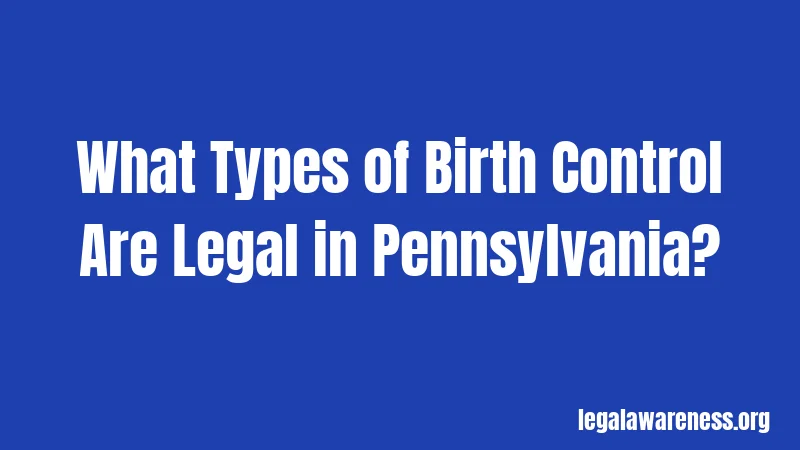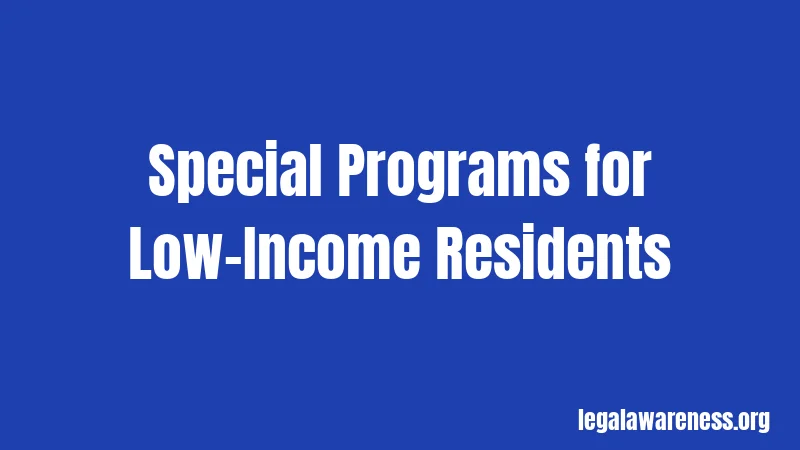Birth Control Laws in Pennsylvania (2026): Your Rights Explained
Most people don’t realize how much the birth control landscape has changed recently. Seriously. In Pennsylvania, access to contraception is currently legal, but there’s a lot happening behind the scenes that could affect your rights. Let’s break down exactly what you need to know about getting birth control in the Keystone State.
Here’s the deal. Pennsylvania is in a unique spot right now. Birth control is legal and accessible, but lawmakers are still fighting over stronger protections. This affects everyone from teenagers to adults, from those with insurance to those without.
What Types of Birth Control Are Legal in Pennsylvania?

All FDA-approved birth control methods are currently legal in Pennsylvania. Yep, that’s all of them.
This includes pills, patches, IUDs, implants, shots, and rings. Emergency contraception like Plan B and Ella are also legal. You can buy these over the counter without a prescription.
The state also allows permanent birth control methods. This includes tubal ligation and vasectomies for adults who choose them.
Nothing restricts which type of birth control you can use. Your choice is between you and your doctor, plain and simple.
Can Minors Get Birth Control Without Parental Consent?
Yes. This one surprises a lot of people.
Pennsylvania’s Minors’ Consent Act allows any minor to get contraception without a parent’s permission. Any minor means anyone under 18. No exceptions based on age.
Wondering if doctors can tell your parents? They can’t. Federal law requires most family planning clinics to keep your information confidential. They cannot notify parents without your permission.
The law also covers pregnancy testing and STD testing. Minors can consent to these services on their own. The same confidentiality rules apply.
This matters because teens who know their information stays private are more likely to seek care. Studies show that about 45% of teens wouldn’t seek care if parents would be notified.
Insurance Coverage: What’s Covered Right Now?

Hold on, this part is important.
Most private insurance plans in Pennsylvania must cover prescription birth control. This comes from federal law under the Affordable Care Act. Plans have to cover at least one method in each of 18 categories.
But there’s a catch. Employers can claim religious or moral objections and deny coverage. This happened in 2020 when the Supreme Court upheld Trump-era regulations. About 126,000 Pennsylvania women lost free birth control coverage through workplace plans.
Starting in 2025, many insurers agreed to cover over-the-counter birth control. This includes Opill, the first FDA-approved OTC daily birth control pill. Governor Shapiro pushed for this coverage, and individual and small group insurers stepped up.
However, coverage isn’t guaranteed for everyone. It depends on your specific insurance plan. You should contact your insurer to check what’s covered.
The Fight Over Stronger Protections
Now, here’s where things get interesting.
Pennsylvania currently has no state-level legal protections for birth control access. Seriously, none. This means if federal protections go away, access could become a real problem.
The state House has tried to change this. In June 2025, they passed House Bill 1140 by a vote of 116-87. Pretty strong bipartisan support, right?
What House Bill 1140 Would Do
The bill would require all health insurance policies to cover FDA-approved contraceptives. This includes emergency contraception and over-the-counter options. Zero copays, zero deductibles, zero out-of-pocket costs.
It would also create a statewide standing order for OTC emergency contraceptives. This means easier access without individual prescriptions.
Religious exemptions would still exist. But only if the contraception isn’t prescribed for a medical condition like endometriosis or PCOS.
The Senate Roadblock
But wait, there’s a problem.
The bill has been stuck in the Republican-controlled Senate since June 3, 2025. It’s sitting in the Banking and Insurance Committee. No vote scheduled. No movement.
In December 2025, three Democratic senators introduced a companion bill, Senate Bill 1112. They’re trying to push this forward. But with a Republican majority in the Senate, passage looks unlikely.
Honestly, this is the most frustrating part. The House passed it with support from both parties. Voters overwhelmingly support contraception access. Yet the Senate won’t even hold a vote.
Special Programs for Low-Income Residents

Not sure if you qualify for help? Let me break it down.
Pennsylvania offers family planning services through Medicaid. This program covers birth control for eligible low-income residents. Coverage includes pills, IUDs, implants, and other methods.
The state made some improvements in recent years. Pennsylvania now allows separate billing for long-acting reversible contraceptives (LARCs) like IUDs and implants. This means women can get them right after giving birth in the hospital.
Before this change, about a third of new moms never got the birth control they wanted. They missed their postpartum appointments. Now they can get LARCs before leaving the hospital.
To apply for family planning services, you can use COMPASS. That’s Pennsylvania’s online system for health programs. You can also complete a paper application and mail it to your County Assistance Office.
Over-the-Counter Birth Control Options
Okay, pause. Read this carefully.
In 2023, the FDA approved Opill as the first over-the-counter daily birth control pill. You can buy it at drug stores, convenience stores, and grocery stores. No prescription needed.
It costs about $20 for a one-month supply. That might sound affordable. But if you use it year-round, it adds up to nearly $250.
Governor Shapiro pushed insurers to cover Opill without requiring a prescription. Many agreed starting in 2025. But there’s a gap for Medicaid recipients.
People on Medicaid still need a prescription for OTC birth control. This creates an extra barrier. It also costs taxpayers more because doctor visits cost money.
Emergency contraception like Plan B is also available over the counter. No age restrictions. Anyone can buy it.
What About Abortion-Related Laws?
This confuses a lot of people, so let’s clarify.
Birth control and abortion are legally different in Pennsylvania. The state’s abortion law specifically excludes birth control from its definition of abortion.
According to Pennsylvania law, using an IUD or birth control pill is not abortion. These methods prevent ovulation, fertilization, or implantation. They don’t terminate a pregnancy.
Some anti-abortion groups try to blur this line. They call IUDs and emergency contraception “abortifacients.” That’s not accurate under Pennsylvania law.
The state allows abortion up to 24 weeks of pregnancy. Minors need parental consent unless they get a judicial bypass. But contraception access has no such restrictions.
How to Get Birth Control in Pennsylvania
Here’s what you need to do.
First, decide what type of birth control you want. Research your options. The FDA approves many different methods.
Contact a healthcare provider. This can be your regular doctor, a gynecologist, or a family planning clinic. Planned Parenthood has locations throughout Pennsylvania.
Ask about insurance coverage. Find out what your plan covers. Ask about copays and deductibles.
If you don’t have insurance, ask about sliding scale fees. Many clinics charge based on income. Some services might be free.
For minors, remember you have the right to confidential care. You don’t need parental permission. Bring your insurance card if you have one.
Where to Get Help
Planned Parenthood operates clinics across Pennsylvania. They offer birth control, pregnancy testing, and STD testing. Most services are confidential.
County health departments also provide family planning services. Call your local health department to find out what’s available.
If you have insurance problems, contact the Pennsylvania Insurance Department. Call 1-877-881-6388. They can help if your insurer denies coverage.
Recent Changes to Watch
Things are moving fast, honestly.
In 2024, Governor Shapiro issued guidance encouraging insurers to cover OTC contraception. Many insurers responded positively. Coverage expanded in 2025.
The Biden Administration proposed federal rules requiring coverage of OTC contraceptives. These rules would have taken effect in 2026. But in January 2025, the administration withdrew the proposal.
This makes state-level protections even more important. Without federal requirements, Pennsylvania needs its own laws.
House Bill 1140 keeps getting reintroduced. It passed the House in June 2024 with a vote of 133-69. The Senate ignored it. The House passed it again in June 2025 with a vote of 116-87. Still waiting on the Senate.
December 2025 brought Senate Bill 1112. Three Democratic senators introduced it. It’s the Senate version of the House bill. It’s in committee now.
Understanding Your Rights
Let’s talk about what you can actually do.
You have the right to use any FDA-approved birth control method. No one can stop you from choosing the method that works best for you.
Minors have the right to confidential contraceptive care. Doctors cannot tell your parents without your permission.
If you have insurance, check your coverage. Most plans must cover prescription birth control. But religious exemptions exist.
You can file a complaint if your insurer wrongly denies coverage. Contact the Pennsylvania Insurance Department. They investigate insurance problems.
Privacy laws protect your medical information. Doctors cannot share your birth control use without your consent. This applies to everyone, including teens.
Common Questions People Ask
Sound complicated? It’s actually not once you understand the basics.
Most people wonder about cost. Prescription birth control should be free under most insurance plans. OTC options like Opill cost around $20 per month. Emergency contraception costs about $40-50 over the counter.
People also ask about age restrictions. There are none for buying OTC birth control. Minors can get prescription birth control confidentially.
Some worry about employer interference. Yes, employers can deny coverage based on religious objections. But they must notify you. You can then seek coverage elsewhere or pay out of pocket.
What about privacy from parents or partners? Your medical care is confidential. Doctors cannot share information without your written consent.
Frequently Asked Questions
Can I get birth control for free in Pennsylvania?
It depends on your insurance. Most private plans must cover prescription birth control with no copay. Medicaid covers birth control for eligible low-income residents. Without insurance, you might pay full price, but clinics often offer sliding scale fees.
Do I need a prescription for birth control in Pennsylvania?
Not always. Emergency contraception like Plan B is available over the counter. Opill, a daily birth control pill, became available OTC in 2024. Most other methods still require a prescription from a doctor.
Can my employer refuse to cover birth control?
Yes. Employers with religious or moral objections can exclude contraceptive coverage from their health plans. This changed in 2020 when the Supreme Court upheld broader exemptions. About 126,000 Pennsylvania women lost coverage because of this.
What if I’m under 18 and want birth control?
You can get birth control without parental permission in Pennsylvania. The Minors’ Consent Act allows any minor to consent to contraceptive services. Your information stays confidential. Doctors cannot tell your parents without your permission.
Does Pennsylvania protect my right to birth control?
Not yet. Pennsylvania has no state law specifically protecting contraception access. Bills have passed the House but stalled in the Senate. Right now, access depends mainly on federal law, which could change.
Final Thoughts
Now you know the basics. Birth control is legal and accessible in Pennsylvania, but protections could be stronger.
Your rights depend partly on your age, insurance, and income. Minors have strong confidentiality protections. Insurance coverage varies by plan. Low-income residents can get help through Medicaid.
The political situation matters too. House Bill 1140 would guarantee coverage, but it’s stuck in the Senate. Keep an eye on this legislation if you care about contraceptive access.
Stay informed about your rights. Know what your insurance covers. Don’t hesitate to ask questions at clinics or call the Insurance Department if you need help.
And remember, nine out of ten women will use birth control at some point in their lives. You’re definitely not alone.
References
- Pennsylvania Department of Health – Teen Pregnancy and Minors’ Consent Act Information – https://www.health.pa.gov/topics/school/Pages/Teen-Pregnancy.aspx
- Pennsylvania Coalition Against Rape – PA Abortion Rights and Birth Control Information – https://pcar.org/blog/pa-abortion-rights
- Pennsylvania General Assembly – House Bill 1140 (Contraceptive Access for All Act) – https://www.legis.state.pa.us/cfdocs/billInfo/billInfo.cfm?sYear=2023&sInd=0&body=H&type=B&bn=1140
- Pennsylvania Insurance Department – Over-the-Counter Contraception Coverage Guidance – https://www.pa.gov/agencies/insurance/consumer-help-center/learn-about-insurance/health-insurance/otc-contraception-insurance-coverage
- ACLU of Pennsylvania – Minors’ Access to Confidential Health Care in Pennsylvania – https://www.aclupa.org/reference-card-minors-access-confidential-health-care-pennsylvania
